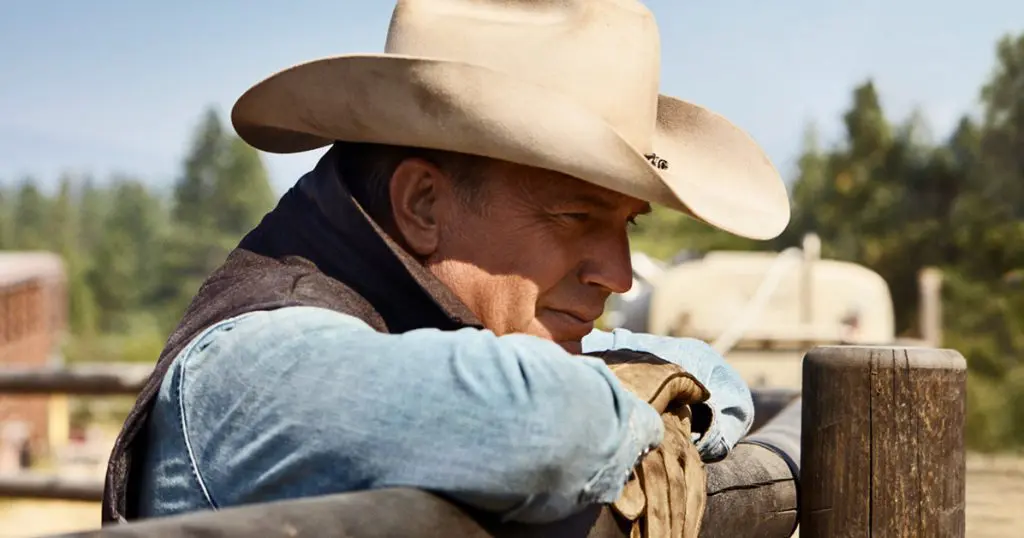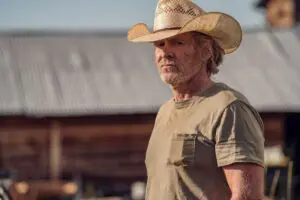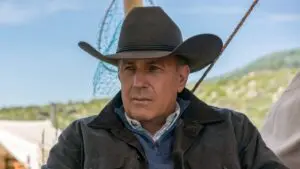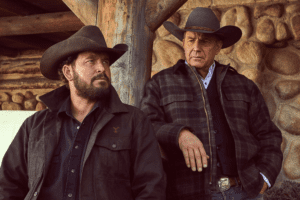Summary
Despite being flawed in a number of ways, the Yellowstone premiere remains compelling thanks mostly to a wealth of on-camera talent and writer-director Taylor Sheridan’s trademark penmanship.
I worry about Taylor Sheridan sometimes. Yeah, sure, he’s one of the finest writers to put pen to paper in an industry overstuffed with hacks that may or may not be serial abusers of women, but the dude’s morbid. Between Sicario, Hell or High Water and Wind River, his creative output has exclusively offered grim, grown-up tales of violence, broken systems, and generations-old prejudice. Setting all the debauchery against the stunning backdrops of untamed lawless frontiers hardly distracts from it all. Almost to prove my point, in the opening scene of the feature-length Yellowstone premiere, which airs on the Paramount Network, Kevin Costner mercy-kills a horse.
Costner plays John Dutton, an almost comically wealthy Montana rancher besieged on all sides by various competing parties who claim ownership of his land. That would be, in case you were wondering, the land his folk stole from the indigenous Americans, an irony that isn’t lost on Sheridan. Maybe that’s the point. Maybe a man prepared to go to great extremes to prevent his already-stolen land from being stolen is his idea of a joke, although that would assume that Taylor Sheridan understands the concept of humor, and isn’t simply an unending font of misery.
I’m not complaining. The Yellowstone premiere was bloated and messy, and there are issues with some of the characterizations, in that there either isn’t any or it skews in entirely the wrong direction. But unlike most critics, I found it to be captivating, thanks in no small part to Sheridan’s finely tuned ear for folksy tough-guy poetics. There isn’t a chunk of originality to be found in the entire 90-minute stretch I’ve seen, but Sheridan’s pen is a pickaxe; when he swings it, he turns up gold.
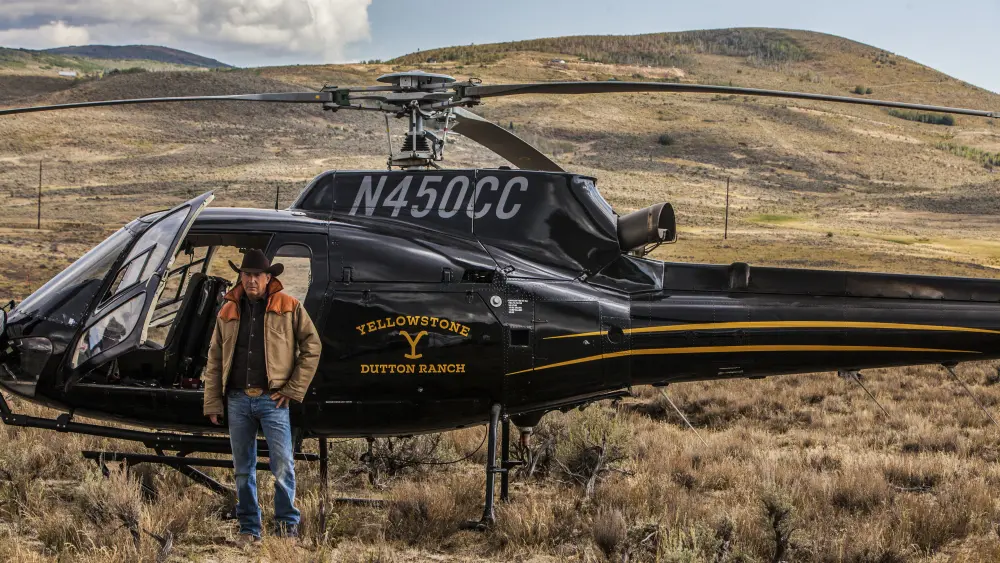
The Dutton patriarch is widowed and a father of several. Sheridan has acted in television before, notably as the Chief of Police on Sons of Anarchy, but Yellowstone is his first TV series behind the camera. (He wrote and directed all eight episodes.) He always works within a genre, but usually on a smaller, tighter canvas. Extending outwards to incorporate an entire clan gives him enough narrative material to pack out eight hours, and if the Yellowstone premiere does seem overstuffed and a little mechanical, I presume it’s because it has a lot of busywork to do in introducing all the various players and their motivations.
One of the Dutton sons, Jamie (Wes Bentley), is a clean-cut legal shark with political ambitions; another, Lee (Dave Annable), stayed at home on the ranch to be given lectures by his flinty father about the difference between being a cowboy and a landowner – of working the land and running it. Two different things, according to John, who runs his enterprise half as a legitimate business, albeit one with some helpful and potentially unethical political connections, and half as some kind of weird mafia that demands all of the ranchmen are branded with Yellowstone’s big “Y”, like cattle.
Cattle, as it happens, account for a major plot point in the Yellowstone premiere, as whether they graze on the Dutton’s land or that of the neighbouring Indian reservation, which is nearby geographically but a world away culturally, is a matter that ultimately comes to be disputed with automatic weapons and two small armies. The reservation is administered by Gil Birmingham as Chief Thomas Rainwater, who plans to buy back his land using the money that the white men lose in his casinos. It seems as good a plan as any.
On that reservation, by the way, is another of the Dutton sons, Kayce (Luke Grimes), who IMDb and several other reviews have referred to as “Cory” despite him never being addressed as such in the show to my knowledge. Glad to see journalistic thoroughness is still intact. Kayce married a Native American woman, Monica (Kelsey Asbille), and lives on the reservation with her and their son, leaving him trapped between two worlds and resentful of a third – that of the rapidly-encroaching urbanites who are being ushered onto the land by a well-heeled property developer played by Danny Huston.
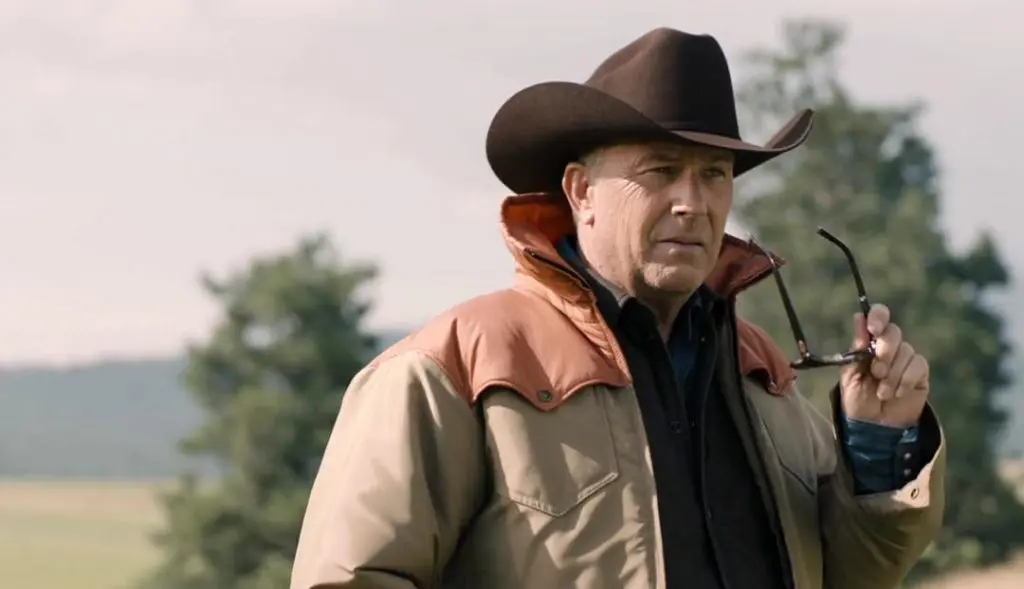
The Dutton boys have a sister, Beth (Kelly Reilly), a sexed-up ballbuster who castrates businessmen by day and often seems transplanted from a different show. It’s a relatively thankless part, but she has some good lines, even if her post-coital criticism doesn’t have anywhere near the sting that Eva Green’s had in 300: Rise of an Empire, which one of her scenes reminded me of.
You can see, then, that the bulk of the Yellowstone premiere is comprised of the usual stuff: meditations on the nature of the West, who it belongs to and what it says about American cultural identity; a backstabbing wealthy family competing for daddy’s affection (hey, that sounds like HBO’s Succession); and a fair helping of ranch life told through anachronistically-scored montage. You’ve seen it all before.
But is that necessarily a bad thing? There’s no shortage of talent on display, either in front of the camera or behind it, and Sheridan shoots the beloved landscapes (on-location in Montana, as well as in Utah) in such a way that is often jaw-dropping. You could condemn the thing prematurely based on how hemmed in it feels by the genre, or on how thin most of the characters are, or on the fact that, thus far at least, there’s nobody to really root for. Or you could just allow a well-made show to unravel a little, to get the nuts and bolts fitted and tightened, and then see where it goes. The sprawling expanse of Sheridan’s imagination might turn out to be barren, but I’d like to think the potential is there for some untapped surprises.

